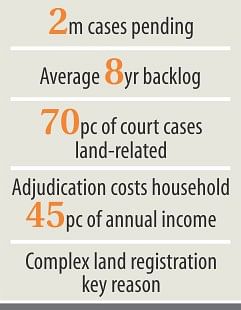One in 7 households facing land disputes

One in every seven households in Bangladesh is involved in land disputes, shows a first ever study, which highlights the toll they take on families financially and in terms of safety and the enormity of the number of litigations the judiciary handles.
Roughly four million households might be facing land disputes at present, says the study, conducted by Policy Research Institute, a local think tank, and commissioned by Human Rights and Legal Aid Services of Brac.
Tilted "Socio-Economic Costs of Property Disputes: An Empirical Examination from Bangladesh", the survey was conducted in June and July this year among 1,050 households in 14 districts from seven divisions.
About two million land related cases are pending with the judiciary, which make up more than 70 percent of all litigations in the country, according to the research report.
Of the resolved disputes, each took about three years to be adjudicated, but some cases found settlement after 17 years, it said.
However, the average time a case remains pending is approximately eight years, while a few cases have been continuing for nearly 40 to 50 years.
The report says 7.5 percent of households with past or present land conflict have experienced a physical assault.
"On the whole, the findings are indicative that land conflict is a serious issue in Bangladesh, and a considerable portion of the population is suffering from such phenomena," said Ashiqur Rahman, senior economist of PRI, and the lead researcher, while presenting the findings at a seminar in Brac Inn in the capital yesterday.
Receiving a former legal assistance costs the households most. Lawyers' fee accounts for about 60 percent of the total costs for resolving a dispute.
The total cost to see through a land dispute is 45 percent of a household's annual income, said Rahman, who had a PhD from the London School of Economics.
More than 18 percent of households with pending or resolved disputes paid, on average, Tk 22,270 as bribe to police, and Tk 5,483 to local arbitrators.
Ahsan H Mansur, executive director of PRI, said the root cause for the anarchy in the land sector lay in registration, as the process was complicated and was not transparent.
"Please, make life simple. The old registration system became outdated many years ago," said the economist.
Mohammad Shafiul Alam, senior secretary at the land ministry, said, "The sector is scarred with so many problems that my heart bleeds when I think about it."
He said the civil courts were not functioning properly in adjudicating the cases because of a lack of capacity.
The secretary, however, said the government was piloting land digitisation in Jamalpur, Rajshahi and Patuakhali. "If we get satisfactory results, the model will be replicated in other districts. Things would change once the land digitisation is completed."
Mashiur Rahman, economic affairs adviser to the prime minister, said the current situation had been created because "all of us are trying to get a share of the decreasing asset".
Hossain Zillur Rahman, executive chairperson of Power and Participation Resource Centre, said a serious political push would be needed to ride out the crisis.

 For all latest news, follow The Daily Star's Google News channel.
For all latest news, follow The Daily Star's Google News channel. 



Comments